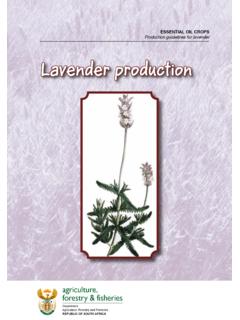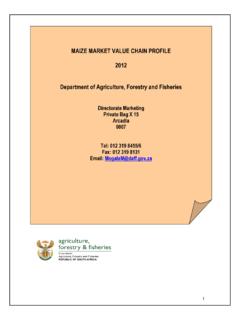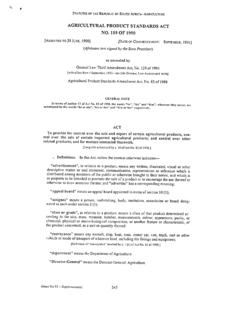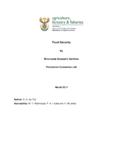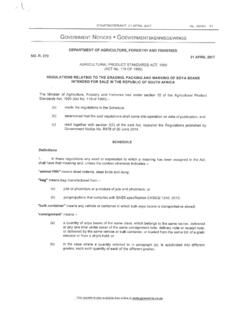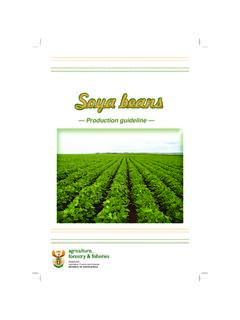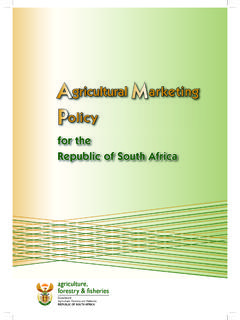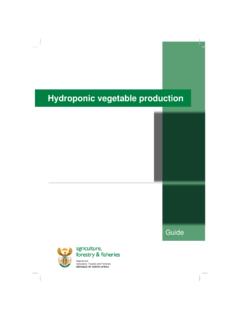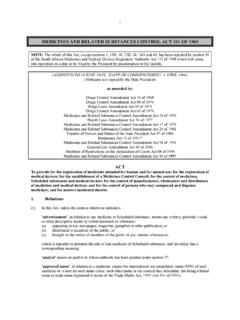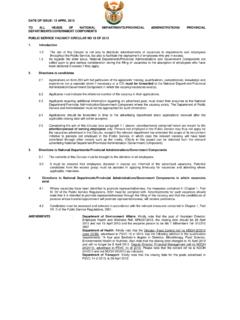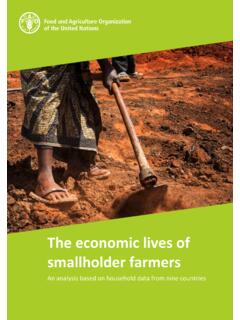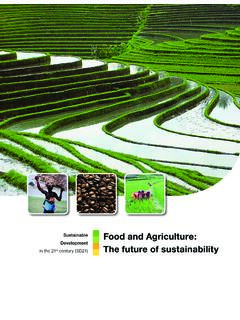Transcription of A framework for the development of smallholder farmers ...
1 agriculture ,forestry & fisheriesDepartment: agriculture , Forestry and FisheriesREPUBLIC OF SOUTH AFRICAA framework for the development of smallholder farmers through cooperative developmentJuly 2012 Directorate Co-operative and Enterprise DevelopmentDEPARTMENT OF agriculture , FORESTRY AND FISHERIESA framework for the development of smallholder farmers through cooperatives development1A FrAme Work For The development oF smallholder farmers Through CooperAiveS DevelopmenT1. IntroductionSmallholder farmers are the drivers of many economies in Africa even though their potential is often not brought forward. smallholder farmers are defined in various ways depending on the context, country and even ecological zone. Often the term smallholder is interchangeably used with small-scale , resource poor and sometimes peasant farmer.
2 In general terms smallholder only refers to their limited resource endowment relative to other farmers in the sector. smallholder farmers are also defined as those farmers owning small-based plots of land on which they grow subsistence crops and one or two cash crops relying almost exclusively on family of the main characteristics of production systems of smallholder farmers are of simple, outdated technologies, low returns, high seasonal labour fluctuations and women playing a vital role in production. smallholder farmers differ in individual characteristics, farm size, resource distribution between food and cash crops, livestock and off-farm activities, their use of external inputs and hired labour, the proportion of food crops sold and household expenditure farmers can play an important role in livelihoods creation amongst the rural poor.
3 Even though smallholder production is important for household food security, the productivity of this sub-sector is quite low. Poor yields may be one of the reasons why urban and rural households either abandon or are unin-terested in agricultural production. There is therefore a need to significantly increase the productivity of smallholder farmers to ensure long term food security. This can be achieved by among others encouraging smallholder farmers to pursue sustainable intensification of production through improved inputs. Declining agricultural performance is a major driving force behind growing poverty among African small-holder farming populations, and its recovery offers the greatest prospects for rural populations to escape out of poverty.
4 Food insecurity among the vulnerable poor rural farming populations induces a risk-mini-mising conservative attitude towards farming and livelihoods systems. It is in this context that the potential role smallholder agriculture makes it significant to either be ignored or treated as just another small adjust-ing sector of the market Constraints faced by smallholder farmersSmallholder farmers in South Africa face various challenges that impede their growth and ability to ef-fectively contribute to food security relative to the commercial farmers . Some of the constraints they face relate to lack of access to land, poor physical and institutional infrastructure. Most smallholder farmers are located in rural areas and mostly in the former homelands where lack of both physical and institutional infrastructure limits their expansions.
5 Lack of access to proper roads, for example, limit the ability of a farmer to transport inputs, produce and also access information. Infrastructure is very poor, markets for agricultural inputs and outputs are often missing and unreliable for smallholder farmers . This means that the acquisition of agricultural resources becomes different and the supply of market services also becomes limited. Lack of assets, information and access to services hinders smallholder participation in potentially lucrative transaction cost is also one of the major factors constraining growth of smallholder farmers and this is largely attributed to poor infrastructure. A poor road network, for example, and unreliable distribution will force farmers to grow their own food and less of perishable commodities causing a lower productivity.
6 Increased cost of transport will also affect inputs used and the market strategies followed by the farmers . In most cases high transaction costs are caused by among others poor infrastructure and communication services in remote rural areas. It can also result from information inefficiencies and institutional problems such as the absence of formal of reliable markets has also been found to be one of the main constraints faced by smallholder farm-ers. Many of these farmers receive low prices for their products by selling them at their farm gate or local markets. However, these smallholder farmers could receive much higher prices by selling their goods in 2 DepArTmenT oF agriculture , ForeSTry AnD FiSherieSketing knowledge and selling skills as well as little recognition of opportunities for product diversification or the limits between market research and product of human capital has also been found to be a serious constraint for smallholder farmers .
7 They are often illiterate with poor technological skills, which can be serious obstacles in accessing useful formal institutions that disseminate technological knowledge. The majority of smallholder farmers are not capaci-tated with financial and marketing skills and are unable to meet the quality standards set by fresh produce markets and food processors. Lack of production knowledge leads to lower quality in a result of low endowment in production factors, such as land, water and capital assets, the majority of smallholder farmers produce low quantities of products that are equally of poor quality, which leads to their products being neglected by output markets. Increasing concentration in the food value chain is a global trend, caused by increasingly demanding consumers and concerns about food safety, which tend to make it very difficult for smallholder farmers to enter high-value markets in light of the low quantity and poor quality of their in production coupled with lack of bargaining power is also a major challenge faced by smallholder farmers .
8 On the one hand most smallholder farmers are not consistent in terms of producing products and supplying them to fresh produce markets and agro-processing industries. On the other hand their bargaining power is very low owing to poor access to market information and limited information and limited access to financial markets, which prevents them from selling their products at the most profitable highlighted above, smallholder agricultural growth will not be achieved without access to support ser-vices. Increasing agricultural productivity requires addressing all problems simultaneously. Cooperative development has been found to be one of the most effective interventions through which growth in small-holder farming could be enhanced thereby creating long term food security, job opportunities and The development of smallholder farmers through cooperative developmentGovernment has identified cooperatives as one of the central pivots to reduce poverty, unemployment and high levels of inequality and to accelerate empowerment and development for the benefit of previously disadvantaged majority.
9 agriculture , including farming, forestry, fisheries and livestock is the main source of employment and income in rural areas where the majority of the world s poor and hungry people live. agriculture cooperatives have been found to play a crucial role in enhancing productivity of smallholder farmers . Being voluntary, democratic and self controlled business associations, co-operatives offer the institutional framework through which local communities gain control over productive activities from which they derive their livelihoods. In the sector co-operatives contributes to food production and distribution, and in supporting long term food security. They offer prospects that smallholder farmers would not be able to achieve individually such as helping them to secure land rights and better market opportunities.
10 smallholder farmers can gain big benefits from agricultural co-operatives including bargaining power and resource sharing that lead to food security and poverty reduction for the millions. They also help in tackling rural poverty by increasing productivity and income of smallholder farmers by helping them collectively negotiate better prices for seeds, fertilizer, transport and storage. They further help farmers expand market access and capture more of the value chain by getting involved in agro-processing activities. 4. Rationale for the development of the frameworkRealising the multiple constraints faced by smallholder farmers and recognising the role that cooperatives can play in the development of smallholder farmers , the Department of agriculture , Forestry and Fisheries 3A FrAme Work For The development oF smallholder farmers Through CooperAiveS DevelopmenTthrough the Directorate: Cooperatives and Enterprise development whose mandate is among other to promote and support the development of cooperatives in the sector saw it fit to develop this document.
